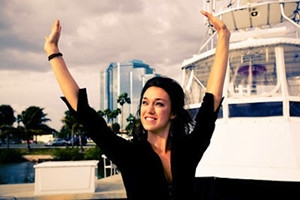(单词翻译:单击)

Todd: So, hello, Alexandra.
Alexandra,你好。
Alexandra: Hi, how are you?
嗨,最近怎么样?
Todd: I'm doing good. Now Alexandra, you're from Miami.
不错。你来自迈阿密?
Alexandra: Yes, I am.
是的。
Todd: OK, so why don't you tell us about Miami.
好的,那你跟我说说迈阿密吧。
Alexandra: Born and raised in Miami, and it's very warm, very warm. Lots of different people. It seems to be the port of Central and South America, so there's several different people from different countries coming through, as well as from Europe and some parts of the North of the United States come down for a visit and it's a tourist destination.
我生长在迈阿密,那儿非常非常暖和。还有很多不同的人种。它貌似是中美洲和南美洲的港口,所以会有很多来自不同国家的不同人种经过此地,而且还会有欧洲和北美的一些人去那儿参观。那还是个旅游胜地。
Todd: Wow, were you born in Miami?
哇,你出生在迈阿密吗?
Alexandra: Yes
是的。
Todd: Really!
真的呀!
Alexandra: Yes, I was.
是的。
Todd: And you lived your whole life there?
你一直都住在那儿?
Alexandra: Yep, yeah, yeah.
对对对。
Todd: That's cool, what's the best thing about Miami?
那不错啊,迈阿密最吸引人的是什么啊?
Alexandra: The weather obviously, weather and the nearness to the ocean. Everything you can think of that can be done on the ocean, you can find a way to do it there.
很显然是气候。还有隔海很近。凡是你能想到在海上做的事儿,在那儿都能做。
Todd: Oh, nice, so what water sports do you play?
哦,不错,那你都玩什么水上运动啊?
Alexandra: There's water volleyball, and do some skiing, and diving, and also during season you can go and catch lobster down in the keys.
有水上排球,滑水,潜水,有龙虾的时候你还可以去一些地方抓龙虾。
Todd: Really
真的吗?
Alexandra: Yes, so it can be fun.
对呀,特别有趣。
Todd: That's so cool. So you catch the lobster and eat it that night?
那很不错啊。你可以白天捉了龙虾,当天晚上就可以享用了?
Alexandra: Yes. Yes. Absolutely. So you just go get the lobster out of the traps, take the upstairs to the boat, so to speak, and just throw them in a pot, and you're gonna have dinner in no time.
是的是的,当然。你就从洞里挖出龙虾,再上楼拿到船上,也就是说,你直接把龙虾扔到锅里就可以直接吃晚饭了。
Todd: You don't eat them on the boat do you?
你们不会在船上吃龙虾吧?
Alexandra: You can.
你可以的。
Todd: Really! People eat the lobsters on the boat?
真的?!人们都在船上吃龙虾吗?
Alexandra: Yeah, you can.
对呀,你也可以。
Todd: Wow. Are they dangerous? I mean, cause they can snip your fingers.
哇,不危险吗?我的意思是龙虾会划到手指。
Alexandra: Well, you don't, you make sure you catch them in the right, hold them from the tail end and people usually put rubber bands around the claws, and you can just throw them into boiling water, get your butter out and you're good to go.
哦,你不必担心。你要确保你抓着它的右爪,握着它的尾端。而且人们通常会用橡皮筋缠住它们的爪子,然后直接扔进沸水里,取出的时候放点黄油,然后你就可以美美地享用了。


